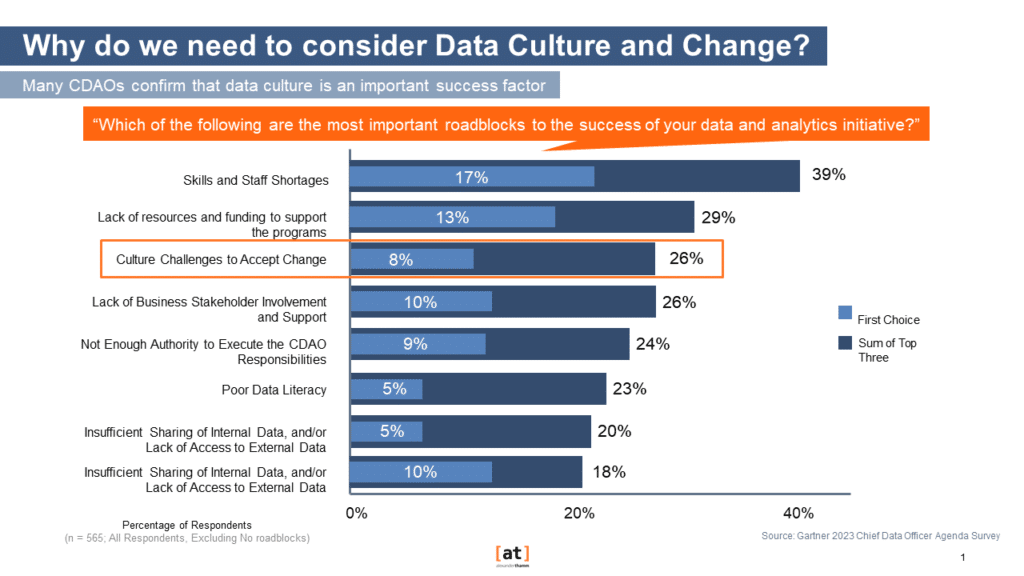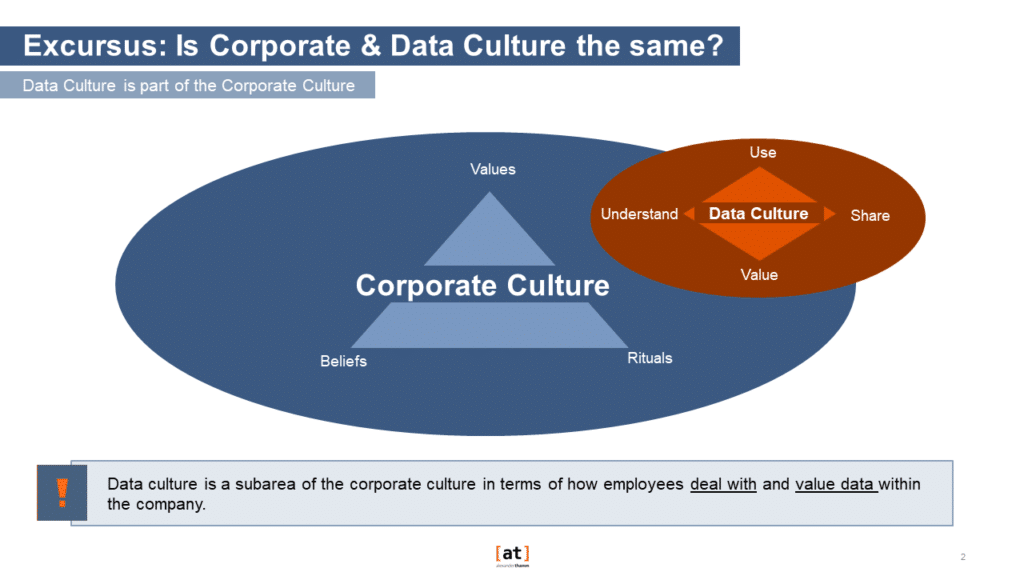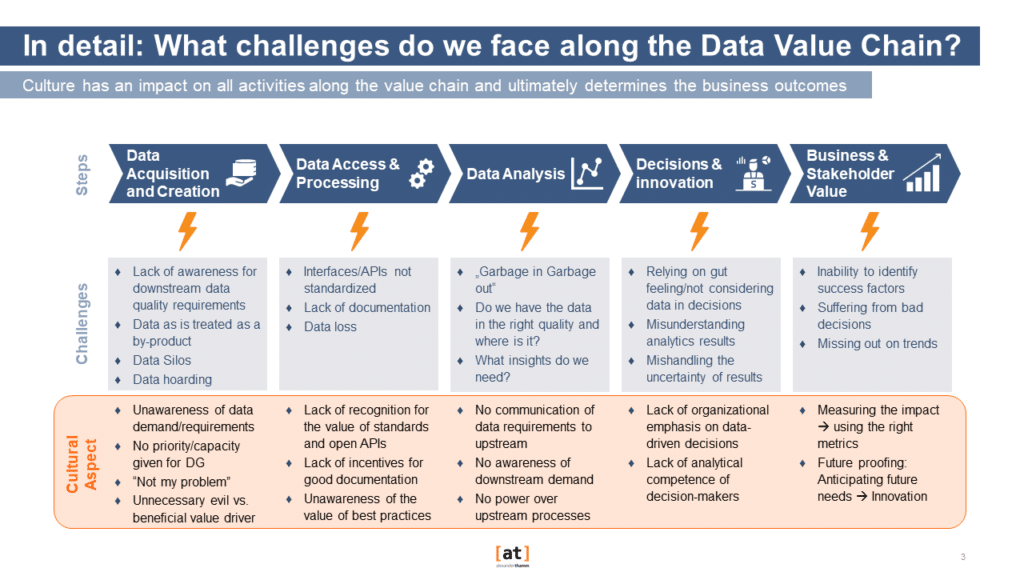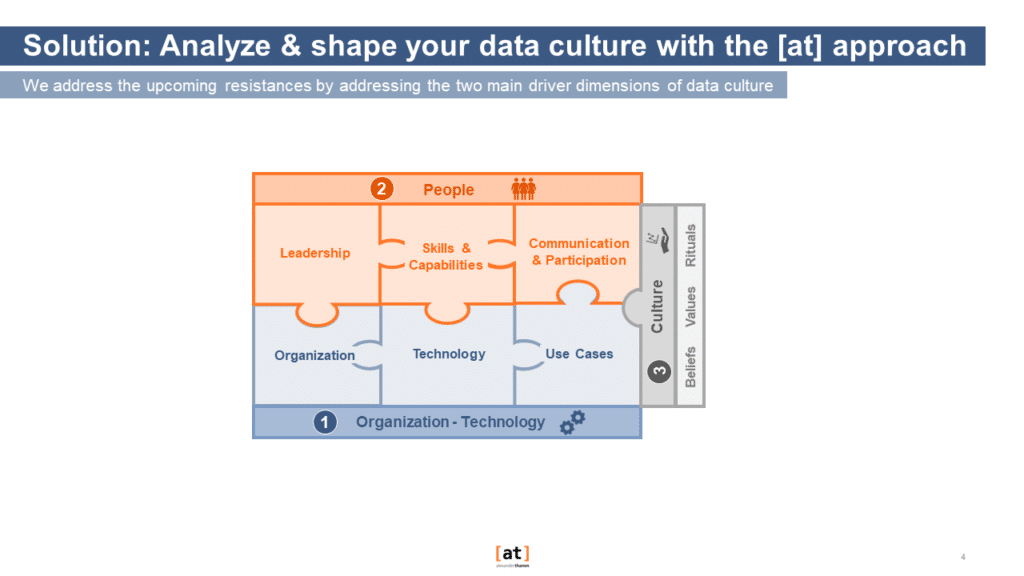In an era where data has become one of the most valuable resources for organisations, a data-driven culture defines the future of success. Organisations today face the challenge of not only collecting data, but also ensuring that their employees understand how to interpret this data and turn it into smart decisions. Surveys among data professionals confirm that, in addition to a lack of resources and specialised personnel, the data culture is of enormous importance for the success of effective data work in the company (see Figure 1). Such a data culture is far more than just a buzzword; it is a decisive success factor that gives companies an invaluable advantage in an increasingly complex and competitive market.

In the following article, we will delve into the world of data culture and explore why it is not just a fad, but a fundamental shift in the way organisations operate and thrive.
Inhaltsverzeichnis
What is a data culture?
Data culture refers to the way an organisation uses, values and integrates data into its daily decision-making processes. It is an organisational mindset and practice that views data as a key resource and encourages its use to make informed decisions, drive innovation and achieve business goals. A positive data culture encourages employees to actively collect, analyse and gain insights from data to make better decisions and drive the business forward. The question is often asked whether the data culture is in line with the corporate culture - this is not the case.
How does it differ from the corporate culture?
Corporate culture is a broader construct and refers to the entirety of the company's organisational structure. shared values, beliefs, norms and behavioursthat prevail in a company. It encompasses how managers and employees interact with each other, how decisions are made, how innovation is promoted and how the organisation interacts with its customers and the public. The corporate culture forms the foundation for the behaviour and attitudes of employees in the organisation.

Data culture can therefore be seen as a sub-aspect of corporate culture, especially in organisations that view data as a strategic resource (see Figure 2). One Strong data culture is often accompanied by a open, innovative corporate culture in which employees are encouraged to share and analyse data and develop creative solutions based on this data. The data culture therefore has specific levers related to data work that need to be actively shaped in order to establish a positive data culture.
What are the challenges of a data culture?
More and more companies are finding that they are not realising the desired added value with their data and AI initiatives. In many cases, the reason for this is that the technologies and processes are not flawless. However, it is becoming increasingly apparent that the right cultural "groundwork" has not yet been laid for the best possible utilisation of data innovations. People lack understanding of data innovation, are overworked and there is a lack of a culture of experimentation and exploration of new ways of making decisions and creating value. Data is not seen as the valuable asset it actually is.
Why we should keep an eye on data culture can be explained very well using the data value chain (see Figure 2).

The Data value chain describes the process of how raw data is collected, stored, processed, analysed and ultimately transformed into data-driven decisions, innovation and business value. This value chain illustrates how data is used and analysed throughout its life cycle. to decisive insights and Innovations can lead. Cultural aspects have a significant influence on the functioning of the data value chain, as they promote the existing challenges along the chain. Typical examples of cultural challenges are
- Ignorance of data needs and requirements
- Data-related tasks and roles (Data governance) are only reluctantly taken over and Low prioritised
- No incentives for good data documentation
- Ignorance of the not yet systematically recorded data treasure
- No appreciation, for example, of data maintenance and processing tasks
- Lack of communication of requirements in the direction of the data generators
- Overload in day-to-day operations
- No culture of data-driven decision-making and Living the meaning
- Missing analytical expertise with managers and employees
- Lack of knowledge about the possibilities of good data analyses
- No consideration of Data competences in recruiting processes on the basis of ignorance
If these cultural challenges are tangible in the company, it is difficult to realise the value of data and the potential that lies dormant in it. The active management of data culture is therefore a key success factor for successful companies.

Discover our top 10 building blocks for a successful data strategy to make your company effectively data-driven.
How do you develop a data culture in a company?
The levers of data culture can be divided into three levels: At the organisational-technical level, the human level and the cultural level (see Figure 3).

1. organisational-technical level
This includes all levers that comprise the factual framework conditions for working with data. In other words, basic framework conditions must be in place to ensure that data work is possible in the company in the first place.
Organisation:
An appropriate data organisation contributes to this. Many companies have developed their own data governance organisation for this purpose. It includes the definition of clear responsibilities for data and rules for handling data. Data governance also contributes to the accessibility and quality of data, which are equally important basic requirements.
Technology:
In order to build a strong data culture, the right tools must also be available to provide users with real benefits. They should help to make data easier to find, access, analyse and interpret.
Use Cases:
In order to take people in the company on the data journey, concrete benefit scenarios and examples are needed that make the added value and success of a data-orientated way of working concrete and understandable. The successful use of data for business purposes should therefore always be visible to everyone.
2nd level human
At the human level, we are dealing with the levers that have to do with all the players and the interaction within the company.
Leadership:
The support and promotion of data-orientated action by management and executives are decisive levers. The management level must recognise the value of data and promote the implementation of a data culture. Here too, only if the use and importance of data is exemplified will identification and proactive action arise on the part of employees.
Skills:
Working with data to create added value requires a specific set of knowledge and methods as a basis. Depending on the company, the skills required of employees vary and specific training programmes need to be set up to enable employees to understand, analyse and use data for their own purposes.
Communication & participation:
Once again, there is no such thing as too much communication. It is essential that everyone involved is sufficiently informed about data-related projects, use cases and the importance of data for the company. In addition, the early involvement of employees in data projects and initiatives and, for example, the establishment of a data community contribute to identification and participation.
3rd level culture
The cultural level contains levers that can be actively influenced on the corporate culture side in order to establish a data culture. Active data work requires a culture of openness, acceptance of errors and joint learning and adaptation. Here too, executives and management can make active contributions and thus prepare the ground for such a culture.
By taking these factors into account and actively endeavouring to promote a data-driven culture, employees can be empowered to use data as a powerful tool for information gathering and decision-making.

Find out more about our data culture workshop in our free flyer and gain further insights into the world of data culture. Our workshop will show you how to improve your data and analytics strategies and build a strong data culture.
Strengthening the data culture for a data-driven company
A data-driven culture is critical to the success of organisations in today's era of data. An effective data culture goes beyond simply collecting data; it requires a deep understanding of data interpretation and its application in smart decision-making. Companies that create such a culture will gain a decisive advantage in a complex market environment.
We have shown the difference between data culture and corporate culture and were able to deduce why active management of data culture is necessary. The concept of the data value chain, which shows how cultural challenges can prevent the utilisation of data, helps us to do this. In companies where these challenges are noticeable, it is difficult to utilise the full potential of data. Active management of the data culture using the levers shown is therefore a decisive success factor for companies.











0 Kommentare